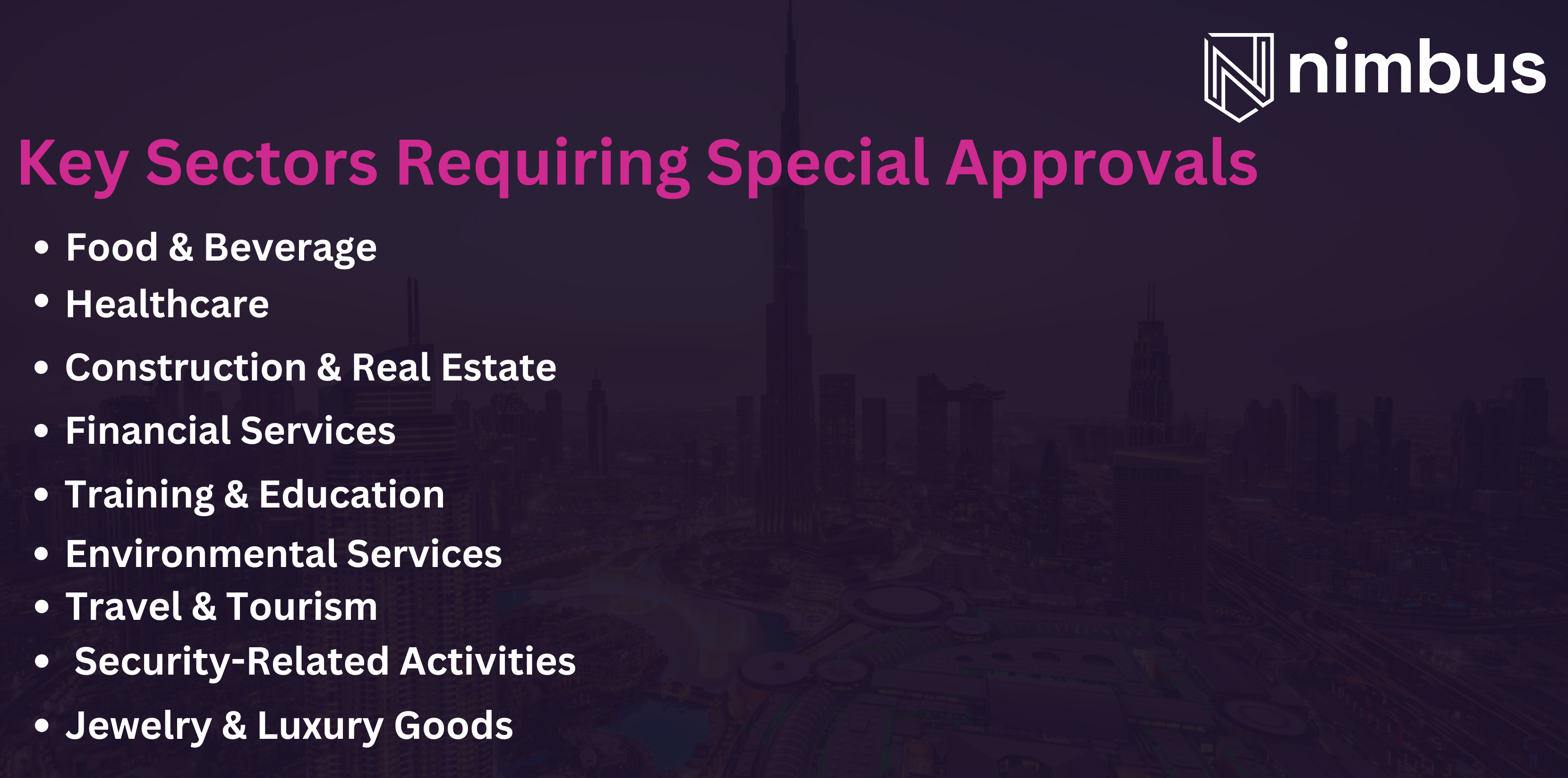Dubai has become one of the leading business destinations in the world with a strong regulatory framework that supports entrepreneurs, SMEs, and large organizations.
While the city offers a simplified process for business setup, certain industries need special approvals from government authorities to ensure compliance with safety, financial, and operational regulations.
This blog post explores the importance of special approvals, sector-specific requirements, and key steps businesses must follow to obtain the necessary permits.
Why Businesses Need Special Approvals?
Special approvals serve multiple purposes, including legal compliance, consumer protection, and alignment with Dubai’s long-term economic objectives.
The government has introduced various policies like the Dubai Economic Agenda (D33), which aims to double the size of Dubai’s economy by 2033. ensuring that businesses meet the required standards contributes to sustainable growth and economic expansion.
Consequences of Non-Compliance
- Heavy fines
- Business closure
- Legal action and reputational damage
Benefits of Obtaining the Right Approvals
- Access to government contracts and business opportunities
- Enhanced credibility and trust among consumers and investors
- Long-term operational stability and regulatory security
Navigating the approval process correctly helps businesses avoid penalties and gain a competitive advantage.
Key Sectors Requiring Special Approvals

Different business sectors in Dubai require regulatory approvals from specific government authorities. Below is a breakdown of some of the main sectors and the necessary approvals.
– Food & Beverage
- Regulatory Authority: Dubai Municipality (Food Safety Department), Dubai Tourism and Commerce Marketing (DTCM)
- Requirements: Compliance with food hygiene standards, food safety certifications, and non-halal food permits if applicable
- Examples: Restaurants, cafés, catering services, and food manufacturing businesses must meet strict hygiene and safety guidelines
– Healthcare
- Regulatory Authority: Dubai Health Authority (DHA)
- Requirements: Medical facility licensing, staff qualification verification, equipment standards, and adherence to medical protocols
- Examples: Clinics, hospitals, and telemedicine platforms must be licensed and comply with international healthcare standards
– Construction & Real Estate
- Regulatory Authority: Dubai Municipality (Buildings Department)
- Requirements: Environmental impact assessments, architectural approvals, and safety compliance
- Examples: Property developers, contractors, and real estate firms need building permits and environmental clearances before starting construction
– Financial Services
- Regulatory Authority: Dubai Financial Services Authority (DFSA)
- Requirements: Adherence to capital requirements, transparency policies, and anti-money laundering (AML) regulations
- Examples: Banks, fintech firms, and investment advisory companies must obtain DFSA approval before conducting financial operations
– Training & Education
- Regulatory Authority: Knowledge and Human Development Authority (KHDA)
- Requirements: Curriculum approval, faculty qualification checks, and compliance with educational facility standards
- Examples: Schools, universities, and professional training institutes must obtain KHDA licenses before offering courses
– Environmental Services
- Regulatory Authority: Dubai Municipality (Environment Department)
- Requirements: Waste management policies, pollution control measures, and sustainability practices
- Examples: Recycling plants, waste management companies, and sustainability consultancies must adhere to environmental protection laws
– Travel & Tourism
- Regulatory Authority: Dubai Tourism and Commerce Marketing (DTCM)
- Requirements: Compliance with tourism licensing, service quality standards, and visitor safety measures
- Examples: Hotels, travel agencies, and tour operators need to obtain DTCM permits for tourism-related activities
– Security-Related Activities
- Regulatory Authority: Security Industry Regulatory Agency (SIRA)
- Requirements: Implementation of security protocols, crime prevention strategies, and risk management measures
- Examples: Private security firms, cash transport companies, and surveillance system providers must adhere to strict security guidelines
– Jewelry & Luxury Goods
- Regulatory Authority: Security Industry Regulatory Agency (SIRA)
- Requirements: High-value inventory security, fraud prevention measures, and customer safety regulations
- Examples: Jewelry retailers, gold traders, and high-end boutiques need to implement security systems and obtain the required approvals
Additional Business Registration Requirements
Apart from sector-specific approvals, businesses in Dubai must also do the following things:
- Register with the Federal Tax Authority (FTA) and apply for VAT registration if their annual turnover exceeds AED 375,000.
- Register employees with the Ministry of Human Resources and Emiratisation (MOHRE) before hiring staff.
How to Secure Special Approvals Efficiently?
Obtaining regulatory approvals in Dubai can be complex, requiring careful planning and a strong understanding of the legal framework. Businesses can follow these steps to streamline the process.
Step 1: Identify the Required Approvals
- Research industry-specific regulations to determine the necessary permits and licenses.
- Consult a business setup expert to avoid compliance issues.
Step 2: Prepare Essential Documentation
- Gather certifications, permits, and trade licenses before submitting applications.
- Ensure paperwork is complete and accurate to prevent rejections and delays.
Step 3: Plan Your Timeline
- Some approvals take weeks or months to process, so factor these into your business launch plans.
- For example, DHA approvals for healthcare businesses can take up to three months.
Step 4: Stay Updated on Regulatory Changes
- Dubai’s business regulations evolve frequently.
- Monitor updates from relevant authorities to ensure ongoing compliance.
Common FAQs About Special Approvals
1) What types of businesses require special approvals?
Businesses in regulated industries like healthcare, finance, real estate, food and beverage, and education require approvals from specific government authorities.
2) What happens if a business operates without approvals?
A business operating without special approvals will need to face the following consequences:
- Heavy fines
- Business closure
- Legal action and reputational damage
3) Do free zone businesses need the same approvals as mainland businesses?
Some free zones have their own regulators, but approvals like DHA for healthcare and DTCM for tourism apply to both free zones and mainland businesses.
Ensuring Compliance for Business Success
Obtaining special approvals is a vital step in launching a business in Dubai. To ensure a seamless process, businesses should:
- Identify the necessary sector-specific approvals.
- Prepare all required documentation accurately.
- Plan ahead to accommodate approval timelines.
For businesses looking for a fully compliant business setup in the UAE, especially in Dubai, professional consultation can provide the guidance and expertise needed for a hassle-free setup.



